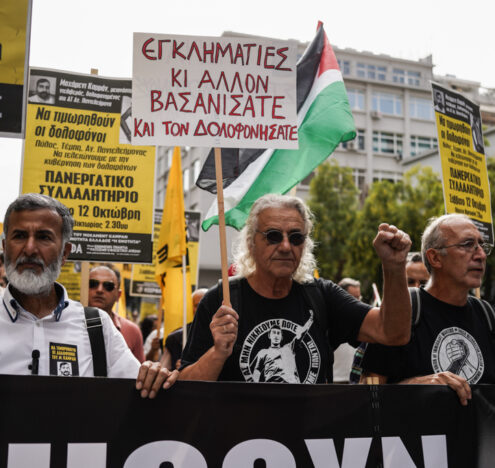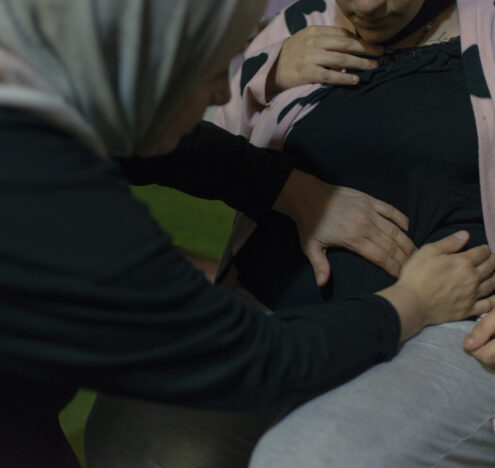Ahead of Tunisia’s election in October — which incumbent president Kais Saied won in a race marred by the ban of most opposition parties — there were waves of arrests of political opponents and critics. Now over 170 people are held in Tunisia’s prisons for their perceived opposition, according to Human Rights Watch. Their relatives remain unwavering in their pursuit of justice.
“Since I was 23, the regime has pestered me because I’m related to Sihem,” said a family member of veteran human rights defender Sihem Ben Sedrine who preferred not to reveal her first name for security reasons. She pointed to a photo to show the striking resemblance.
Sitting in her cozy living room, upset and drained, Ben Sedrine spoke of the police harassment she has endured since the time of President Habib Bourguiba, who ruled Tunisia for more than 30 years after its independence from France in 1956. From questioning to monitoring her movements, police officers have been a constant presence in Ben Sedrine’s life. “For years, a plain-clothed officer would regularly follow me on my commute, another would wait outside my workplace and ask me about Sihem.” The next of kin remembered the frightening days of President Zine el-Abidine Ben Ali, “When returning from work, I would systematically search my house for any hidden wiretaps.”
After the Arab Spring
A leading opposition figure in Tunisia, 73-year-old Sihem Ben Sedrine has paid a high price for her longstanding activism, working for almost 40 years to expose human rights violations in Tunisia.
First incarcerated in 1987 during the presidency of Bourguiba and again in 2001 under the autocratic rule of Ben Ali, she went into exile in 2010 amid increased pressure from the authorities and mounting threats, and returned to her homeland after the 2011 revolution. She has been a vocal critic of President Kais Saied’s regressive policies in the wake of the Arab Spring.
The renowned human rights activist, who headed Tunisia’s post-revolution Truth and Dignity Commission (IVD) between 2014 and 2018, was detained at the beginning of August in relation to her work as president of the commission. The IVD was tasked with uncovering the truth about abuses and corruption committed by state officials between 1955 and 2013, and proposing measures for accountability.
The former head of the IVD is accused of receiving a bribe to “falsify” the commission’s final report on alleged corruption in the banking system regarding the Franco-Tunisian Bank case. She was banned from leaving Tunisia last year. Her request for release was rejected in September.
Following Sihem Ben Sedrine’s arrest, 23 human rights organizations signed a statement calling her prosecution a “flagrant violation” of Tunisia’s transitional justice law.
UN experts issued a call to the Tunisian authorities demanding respect for judicial guarantees and protection of Sihem, and said the arrest “appears to be aimed at discrediting” the commission’s report.
“There’s no concrete evidence against her,” said Ben Sedrine, who cannot see a valid reason for her pre-trial detention. “They don’t let her work because those are weighty files involving top officials,” she added, referencing the crimes documented by the IVD.
The close relative delivers clothes weekly to Sihem, who is detained in the Manouba prison in Tunis, and food twice a week which she shares with her five inmates. “I can bring four boxes, not more, or they won’t let them in,” she said. Preparing food baskets is a complicated process involving a host of restrictions. Spices and herbs are forbidden. Vegetables are only accepted if chopped coarsely. Fruits must be cut in halves or quarters.
Ben Sedrine can only see her loved one for a 10-minute weekly visit after waiting as many as 5 hours. They talk via a phone behind glass, a camera over their heads, with a guard in the room
The woman holds onto hope while Sihem’s husband, activist and journalist Omar Mestiri, liaises with lawyers advocating for her release. “Omar can’t sleep at night, and I’m stressing out,” she added, “we’re afraid she’ll be held for longer.”
Patterns of Abuse
“Sonia didn’t commit any crime. She was imprisoned for giving her view,” Ramla Dahmani said, talking calmly but resolutely in her family home. Her sister Sonia Dahmani, a prominent lawyer and commentator, was arrested on May 11 after making ironic remarks on television. “What kind of extraordinary country [Tunisia] are we talking about? The one that half of its youth want to leave?” Sonia had said, questioning why sub-Saharan migrants would want to settle in Tunisia, and rebutting a claim by Saied that the country was being overrun with immigrants from other parts of Africa.
Masked police raided Tunisia’s bar association offices and abducted the 56-year-old lawyer, known for her criticism of Saied. The lawyers’ group condemned the raid as a “blatant and unprecedented attack on the Tunisian legal profession.” She was charged with spreading false information and disrupting public order based on Decree 54, a 2022 cybercrime law that, according to Human Rights Watch, has been used to silence critics of the president’s regime.
First convicted in July, Sonia’s sentence was reduced from one year to eight months on appeal in September without a hearing. “There was no trial. We found out about the verdict through a leaked news on social media,” Ramla told Inkstick, “it’s Kafkaesque.” In October Sonia was also sentenced for two years in another case.
Ramla also denounced the mistreatment her sibling has suffered while in custody in the Manouba prison. On Aug. 20, when Sonia was due to appear at her appeal trial, she alleges she was subjected to a degrading body search. “She was stripped naked and asked to kneel, then on her back, spreading her legs and buttocks,” Ramla said. According to reports, Sonia was also forced to wear plastic prison flip-flops and a long white veil typically worn by female inmates accused in morality cases. Her family has filed a lawsuit for abuse and torture.
By detaining our loved one, as a family we’ve been deprived of a normal life.
Ramla Dahmani
Describing Sonia’s dire conditions of detention, Ramla says Sonia described spending five weeks without a shower during the summer, was previously denied hyperthyroidism medications, and that there are rats and cockroaches in her cell.
“I’m in an arm-wrestling duel with the prison to improve her day-to-day life,” Ramla said, stressing that it is a constant battle to bring her anything from food to books. But this is not her only fight. Ramla coordinates with the defense team, puts pressure on Sonia’s legal representatives, and works to publicize Sonia’s case to make sure she is “not forgotten,” counting on the mobilization of fellow lawyers abroad.
“By detaining our loved one, as a family we’ve been deprived of a normal life,” Ramla told Inkstick, saying that she had to quit her job and leave her husband and two children back in Paris following the arrest. Nonetheless, she remains optimistic about seeing her freed from her unjust incarceration.
“A Political Matter”
Since President Saied’s power grab in July 2021, authorities have arbitrarily jailed opposition politicians, activists, journalists, human rights defenders, businessmen, lawyers and judges.
Over 60 people have been arrested under the repressive Decree 54, according to the National Union of Tunisian Journalists.
Visiting prisoners has also become difficult for lawyers. Since the spring, they need a daily permit from the appeal court and can just see one or two detainees. “We get it by 11:30 am, then we have to go to the prison and wait,” said lawyer Haifa Chebbi, who represents six people currently detained on unfounded conspiracy allegations, including her 66-year-old uncle, opposition activist Issam Chebbi.
“‘Lawyer visits in prison are our oxygen,’ we’re told by the prisoners,” Chebbi told Inkstick, “they need to stay informed knowing their freedom depends on the political situation.”
Issam was arrested by an anti-terrorism squad in late February 2023 after his home was searched. He has been held in custody in Mornaguia prison for “plotting against state security.”
Amnesty International documented the cases of eight opposition leaders arrested under the same investigation, six of whom remain in detention. This for exercising their freedom of expression or assembly, said Chebbi. In September of last year, an appeals court rejected a request to free the six, including Issam. In February, the group went on a hunger strike to protest their arbitrary detention.
“These detainees are considered terrorists but their files are empty.” Chebbi lambasted what she qualified as “illegal detention.” She said, “they’ve been literally kidnapped by the state.” The lawyer also noted that her uncle is a “well-respected” figure whose only concern is the state of his country.
Pointing to Issam’s jail conditions, the attorney explained that he is under surveillance with cameras and lights on 24 hours a day. For a period, he went without a shower or toilet, and medical care is inadequate. Food allowed in is very limited, and he cannot heat his meals.
The case is now pending. Issam hasn’t seen the judge since Feb. 25 last year. He has just been sitting in his cells.
His niece is not hopeful. She and her defense committee for the accused have tried complaints, sit-ins, and press conferences in vain. “It’s a political matter and it will be only resolved through a political decision,” Chebbi concluded.





















